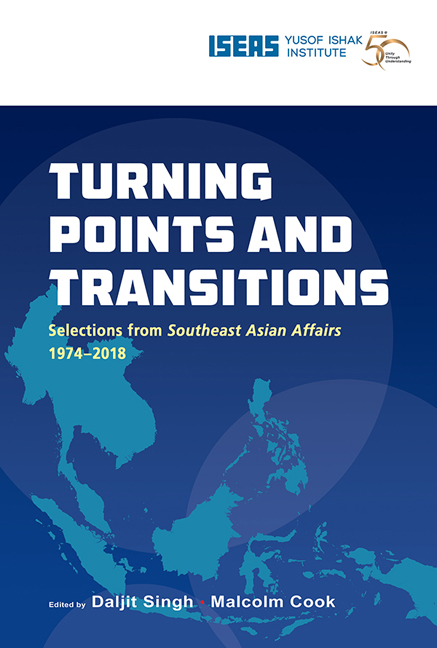Book contents
- Frontmatter
- Contents
- Message from the Director
- Foreword
- Foreword
- Introduction
- THE REGION
- BRUNEI
- CAMBODIA
- INDONESIA
- LAOS
- MALAYSIA
- MYANMAR
- THE PHILIPPINES
- SINGAPORE
- THAILAND
- The Revolutionary Situation in Thailand (1975)
- American Military Withdrawal from Thailand (1976)
- The Thai Economy: From Boom to Gloom? (1997)
- Thailand: A Year of Diminishing Expectations (1999)
- Thailand: A Reckoning with History Begins (2007)
- What Went Wrong with the Thai Democracy? (2015)
- VIETNAM
Thailand: A Year of Diminishing Expectations (1999)
from THAILAND
Published online by Cambridge University Press: 29 May 2019
- Frontmatter
- Contents
- Message from the Director
- Foreword
- Foreword
- Introduction
- THE REGION
- BRUNEI
- CAMBODIA
- INDONESIA
- LAOS
- MALAYSIA
- MYANMAR
- THE PHILIPPINES
- SINGAPORE
- THAILAND
- The Revolutionary Situation in Thailand (1975)
- American Military Withdrawal from Thailand (1976)
- The Thai Economy: From Boom to Gloom? (1997)
- Thailand: A Year of Diminishing Expectations (1999)
- Thailand: A Reckoning with History Begins (2007)
- What Went Wrong with the Thai Democracy? (2015)
- VIETNAM
Summary
At the end of 1997, many Thai people hoped that 1998 would be the starting point for reforming the country. Even though the Thai economy was severely hit by the economic crisis, the new government of Chuan Leekpai promised economic recovery and better governance. As time went by, however, and the economy went into a sharp decline, expectations slowly diminished. The Chuan government rode out these difficulties, and had some success in projecting itself as the only option, but encountered increasing pressures from a critical civil society.
Thailand under the IMF
When the International Monetary Fund (IMF) was asked by Thailand to help in the crisis after the devaluation of the baht in July 1997, many sectors of Thai society welcomed it as a force that could discipline what was perceived as an irresponsible gang of politicians and businessmen whose ineptitude had brought the country to its knees. Many technocrats even hoped that the structural adjustment programme might help dismantle crony capitalism in Thailand.
Initially, the IMF imposed a largely traditional formula on Thailand, involving cuts in government funding, increased taxation, high interest rates, greater disclosure, and financial sector reforms. It did, however, require much greater reforms of the financial sector than was normal for such programmes, together with other structural reforms to open the country up to foreign investment, and accelerate the spluttering pace of privatization. Thailand had experienced IMF tutelage before — in the mid-1980s when a period of global recession had a particularly debilitating effect on the financial sector. It was prepared to accept new IMF controls because officials felt that the key to recovery was to win back the confidence of foreign capital, and to do this it had to adhere to the IMF programme.
The Chuan government was more willing than its predecessor to take tough decisions, and to implement them. However, there was no initial easing of the economic problems. The baht declined to an all-time low against the U.S. dollar in January (US$1 = 55.5 baht) before it began to strengthen as part of a broader regional trend in February. Even as the currency stabilized, the economy plunged deeper into recession, contrary to the expectations of the IMF and others.
- Type
- Chapter
- Information
- Turning Points and TransitionsSelections from Southeast Asian Affairs 1974-2018, pp. 665 - 677Publisher: ISEAS–Yusof Ishak InstitutePrint publication year: 2018

